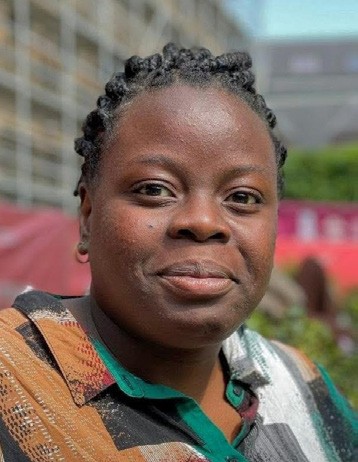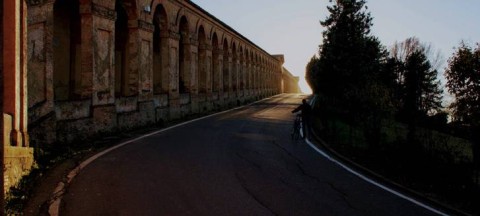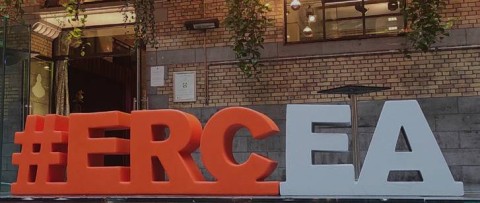Special Issue: Open Science in its many forms - From unawareness to conviction: The essential role of Open Science for everyone
Newsletter
Six years ago, accessing scientific literature was challenging, and the concept of Open Science felt distant and unfamiliar. Today, I am dedicated to ensuring my research is as accessible as possible. This is the story of my transformation from a student constrained by paywalls to a researcher dedicated to Open Science, promoting knowledge-sharing for all.
Bionote
Christina Makoundou is an MSCA Postdoctoral Fellow committed to advancing safer and more sustainable urban infrastructure. Her work focuses on vulnerable road user safety and valorizing waste and bioresources, such as rubber, oils, and lignin, as alternatives in construction. Initiated into Open Science practices through her research and further inspired by her experience as a project follow- up practitioner, she is passionate about making knowledge accessible and fostering collaboration. Beyond her research, she is an active member of the Marie Curie Alumni Association, where she contributes to the Communication (through the newsletter and Irradium Magazine as member of the Editorial board), Sustainability, and GEDI working groups,, as well as participates in multiple regional chapters.

From paywalls to Open Access: My journey to Open Science
Six years ago, I could not define Open Science or appreciate its potential to make research more accessible. Accessing scientific literature seemed impossible—paywalls and subscription fees made knowledge inaccessible, and the idea of free research seemed almost unreal. During my studies, we were taught to navigate paywalls, with the assumption that open-access documents lacked quality. This system instilled the idea that “valuable research costs,” and I did not question it until I realized the broader implications of this model.
Over time, my perspective changed. I saw how restricted access was not just limited to me as a researcher but to everyone seeking knowledge. Why should vital research be locked behind paywalls, available only to those who can afford it? Open Science, which democratizes knowledge, seemed like the answer. Anyone, regardless of resources, should have access to scientific findings.
Today, I am committed to making my research freely available whenever possible. However, the current system presents challenges, particularly for researchers with limited funding. Open-access publication fees are often significant, creating barriers not just for readers, but also for researchers. These costs make Open Science harder to pursue.
Implementing Open Science in practice
Despite these challenges, I have sought ways to make my research accessible. I use author- accepted versions or preprints to share my findings openly without incurring substantial costs. This allows me to encourage Open Science principles while adhering to the constraints of traditional publishing.
My commitment to Open Science has been strengthened by my MSCA fellowships, which provided funding that made open access somehow financially possible. Through this opportunity, I became familiar with structured Open Science practices. Yet, I noticed that clear guidelines for Open Science, especially for early-career researchers, are lacking, and what about those who do not have the advantage of specific funding? This gap can create barriers for scientists eager to embrace Open Science but without the means to do so.
Learning through collaboration
A pivotal experience in my journey was my role as a project follow-up practitioner at the European Research Council (ERC). I worked on addressing Open Science challenges for EU- funded researchers. This experience deepened my understanding of Open Science practices and highlighted the need for more consistent and accessible practices across institutions.
Apart from my scientific dissemination, another milestone on my Open Science journey was my involvement with the Swedish Tyre Recycling Organisation (SDAB) and their ELTRP platform, which focuses on making research related to recycled rubber accessible. As a proofreader, I have helped ensure that as much research as possible is available openly. SDAB, which acted as a non-academic advisor during my MSCA PhD fellowship, practically introduced me to the concept of making science “FAIR”—Findable, Accessible, Interoperable, and Reusable. This framework is essential, and I believe it should be applied also to other fields.
Through these experiences, I have learned that although I am still not an expert in all practices, I am dedicated to learning and improving my understanding of Open Science. Each step I take brings me closer to my goal of making science accessible and inclusive. Recently, I discovered the UNESCO working group's Recommendation on Open Science. Learning from global experts reinforced the need for a collaborative, inclusive approach to making research accessible and transparent.

Mentoring the next generation of Open Science advocates
Now, as a mentor and supervisor for students, both through MSCA projects and independent research, I strive to introduce them to Open Science as early as possible. By teaching the value of openness, I hope to encourage my students to make their research accessible and to contribute to the growing Open Science movement.
Introducing students to Open Science practices and possibilities early in their path helps them understand the importance of knowledge sharing. As potential future researchers, they might play a vital role in the continued evolution of open, collaborative science. Through mentorship, I hope to support them in embracing open science and continuing the shift toward a more inclusive scientific ecosystem.

Looking ahead: A call for support and awareness
As I continue this journey, I see a need for broader institutional or even systemic shift, change and support to make Open Science sustainable for all researchers. Universities and funding bodies can help by providing clear guidelines, support, and training, particularly for early-career scientists. Open Science should be the standard, not a privilege reserved for those with specific funding or resources.
Reflecting on my journey from unawareness to active participation, I am reminded of the transformative power of Open Science. For science to truly benefit society, it must be available to everyone seeking it.
Christina Makoundou
MCAA Newsletter Editorial Board
MSCA Postdoctoral Fellow, University of Antwerp
christina.makoundou@uantwerpen.be